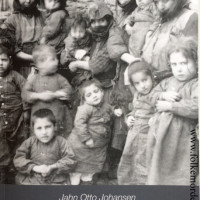http://armenia.no/folkemord/osloconference.html
The Armenian Genocide and the Politics of Denial
International Conference, March 6, Oslo, Holocaust Senteret, Oslo March 6, 2015
Marking the 100th anniversary of the Armenian Genocide, Holocaust Senteret (Center for Studies of the Holocaust and Religious Minorities), arranged a high profile international conference titled The Armenian Genocide and the Politics of Denial in Oslo March 6, 2015. The event aimed to map the state of current research on the Armenian genocide and grasp with a broader question of denial.
An impressive list of topics andpr esenters was put together by Holocaust Senteret’s senior research Anton Weiss-Wendt and the staff, making the conference a great success.
Anton’s introduction at the first session titled New Research on the Armenian Genocide, was followed by leading Armenian Genocide scholar Taner Akçam’s (Clark University, USA) keynote address “The Armenian Genocide and the Issue of Radicalization in Decision-Making Proces”. Professor Akçam presented results of studies of cyphers from Army headquarters and the Young Turks regime to regional army units, heads of provinces etc, revealing trends in decision-making regarding the Armenian genocide.
The first panel titled New Research on the Armenian Genocide, chaired by Anton Weiss-Wendt, followed.
Matthias Bjørnlund (Danish Institute for Study Abroad) presented his topic “The Armenian Genocide as Scandinavian History”, pointing out the immense engagement by Scandinavian missionaries and relief workers in Western Armenia under Ottoman rule, documentation of the genocide carefully produced by them and political and humanitarian led Denmark-wide efforts in mobilizing material and political capital to help the ravished Armenians. Among his conclusions were that the Scandinavian and American relief to Armenians in Western Armenia/Eastern Anatolia and wider Middle East in starting from the Hamidian massacres, through the Genocide of 1915 and after the great calamity, constituted the first humanitarian movement and engagement paving the way to humanitarianism as we know it today. His revelations also included the significant role of the Danish Royal Family in fundraising and awareness raising efforts in Denmark, influenced by the Greek King of Danish Royalty, who reported about fleeing Armenians, deaths and devastation.
Sigurd Sverre Stangeland’s (Norwegian University of Science and Technology) presentation “Involvement of German Military Officers in Rescue Operations during the Armenian Genocide” shed light on the role of the German Army officers, namely the outstanding efforts officers of Baghdad Bahn to save Armenians by significant political and diplomatic interventions and financial engagement.
Vahé Tachjian (The Houshamadyan Project, Germany) then presented his topic “Diaries, Memoirs, and Memory Books: Unsilenced Voices of Ottoman Armenian History and Genocide” eloborating on the scope and value of eye-witness accounts, diaries, memories and autobiographies as sources for genocide scholars and historians studying Ottoman Armenian History and Genocide.
After a dynamic and engaging Q&A session with panelists, the audience and speakers joined the opening ceremony of the exhibition “The Armenian Genocide and Scandinavian Response” at Holocaust Senteret. Matthias Bjørnlund made the opening remarks.
Guests and speakers reconvened after lunch for the second session titled Critical Assessment of Genocide Denial, chaired by Bård Larsen (Think tank Civita, Norway).
Uğur Ümit Üngör’s (University of Utrecht, the Netherlands) presentation titled “Contested Past: The Armenian Genocide in Turkish Official History and Social Memory” focused on various aspects of Turkish Official History and Social Memory. He presented testimonies of residents of eastern provinces about their grandparents’ stories on how the latter killed Armenians. He also touched upon the current policies of deliberate destruction of cultural heritage by Turkish authorities.
Seyhan Bayraktar (Independent scholar, USA) then talked on “The Making of a Non-Event: The Changing Narrative of the Armenian Genocide in Turkey”
She was followed by Professor Yair Auron (The Open University of Israel) on “Recognition and Denial: France, Israel, and the Armenian Genocide.” Professor Auron focused on the role Israeli non-recognition plays on the international recognition situation linking it to various internal and external geo-political factors and morality.
Anton Weiss-Wendt (HL-senteret) then presented his research findings titled “The Soviet Discourse on Genocide and Socialist Armenia.” He talked about various phases and trends of suppression of the topic by central authority in Moscow, and partial loosening of the censorship on the Armenian Genocide every decade, aimed to appease Armenians, when nationalist flavors were being spotted in the republic. He presented materials on the unprecedented demonstration by over 100.000 people in Yerevan in April 1965, on the 50th anniversary of the Armenian Genocide, an unprecedented and grandiose event for that period of the Soviet history.
The second session was followed by another round of active Q&A.
Here you can check the full program of this international conference here.
Some video recordings from the presentations are presented below (pardon the quality).


